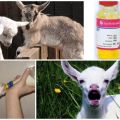What diseases does vaccination protect goats against and what vaccinations are given
Keeping goats is not as troublesome as, for example, keeping a cow. But no less interesting, and most importantly - profitable. Goats also provide milk and meat and give birth to kids that can be sold. And the very observation of these animals will bring a lot of joy. They can be successfully kept in the country during the summer season. Just before buying a mammal is it worth learning important information about goat vaccination, how and why it is done.
What is vaccination for?
Scheduled vaccinations of domestic cattle were previously mandatory in Russia, but with the collapse of the USSR and the abolition of most collective farms, they became voluntary. However, this does not relieve the farmer of responsibility for their animals in the event of a mass infection, and payment of fines.
Vaccinations are designed to protect livestock from infections that pose the greatest danger to both animals and humans. When vaccinated, a weakened strain of the virus enters the goat's body. Thanks to this, the mammal will not get sick, but will develop immunity in the event of a real encounter with the disease. However, even timely vaccination does not give a 100% guarantee that the animal will remain healthy in any case.
What vaccinations are given to goats
There is a list of basic vaccinations. In addition, there are those that are due to the characteristics of the area where the animal is kept. For example, in regions where ticks are especially active, vaccination against encephalitis is considered mandatory. Moreover, both goats and their owner are vaccinated, since one can infect the other.
In Russia, goats should be vaccinated according to the following list:
- From rabies.
- For brucellosis.
- Against anthrax.
- From foot and mouth disease.
- Inject antiparasitic drugs.
Newborn lambs
Vaccinations of sheep and goats begin when the animal reaches at least 3 months of age. However, in the case of foot and mouth disease, even newborn lambs are subject to vaccination.
Youngsters
The first vaccine, which is on the mandatory list, protects against brucellosis. This disease is chronic and causes complications in the reproductive system, endometriosis, miscarriages. As a result, the goats become sterile. But even after the illness, the goat remains the carrier of the virus and must be slaughtered. The danger of brucellosis is that a sick goat or sheep can infect the person who cares for it. In humans, the nervous, cardiovascular and reproductive systems are affected. Vaccination is carried out to four-month-old kids. And they record the result for verification every six months.

The second most dangerous disease, from which young animals are also vaccinated, is rabies. The virus attacks the nervous system and is fatal. Not treated. A kid in 3-4 months is vaccinated under the supervision of a veterinarian. There are several types of vaccines. They are freely available at veterinary pharmacies.
Animals are also vaccinated against anthrax at 3-4 months, immunity is developed within 2 weeks and lasts up to a year.
At the age of 6 months, the vaccination is duplicated. The vaccine is available in dry and liquid form for convenience. Goats and sheep that have died from this disease are dangerous even after death. Their corpses cannot be buried in cattle burial grounds, but can only be burned.
Adults
Sexually mature goats need regular repetitions of previously made vaccinations, as well as seasonal vaccination against parasites (helminths and ticks). Vaccination against worms is carried out before pasture.
In addition, it is necessary to check the livestock for leukemia every six months. And adults should be vaccinated against tetanus, tuberculosis and enterotoxemia.











